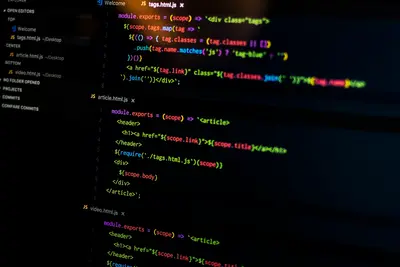⏰ AlmaLinux Cron Jobs: Complete Automation & Scheduling Guide
Welcome to the amazing world of cron jobs on AlmaLinux! 🎉 Imagine having a personal assistant that never sleeps, never forgets, and can run tasks exactly when you want them to. That’s what cron jobs do for your Linux system! Whether you need to backup files, clean temporary directories, or run maintenance scripts, cron is your automation superhero! 🦸♂️
Cron jobs might seem mysterious at first, but they’re actually quite simple and incredibly powerful! 💪 From running a simple backup every night to complex system maintenance routines, we’ll learn how to automate everything step by step. Get ready to become an automation expert and make your AlmaLinux system work for you 24/7! ✨
🤔 Why are Cron Jobs Important?
Cron jobs are essential for efficient system administration! Here’s why you should master them:
- ⏰ Perfect Timing: Run tasks at exactly the right time, every time
- 🔄 Automation: Set it once, runs forever without manual intervention
- 💾 Regular Backups: Automatically backup your important data
- 🧹 System Cleanup: Remove temporary files and old logs automatically
- 📊 Monitoring: Run health checks and generate reports regularly
- ⚡ Resource Optimization: Schedule heavy tasks during off-peak hours
- 🛡️ Security Updates: Automatically apply security patches
- 📧 Notifications: Send regular status reports and alerts
🎯 What You Need
Before we start automating tasks, make sure you have:
✅ AlmaLinux 8 or 9 installed and running ✅ User account with appropriate permissions (your user or root access) ✅ Basic terminal knowledge (cd, ls, cat commands) ✅ Text editor familiarity (nano, vim, or gedit) ✅ Understanding of basic shell scripts (helpful but not required) ✅ Some tasks you want to automate (backups, cleanups, etc.) ✅ Knowledge of Linux file permissions (chmod, chown basics)
📝 Understanding Cron System
Let’s start by understanding how cron works! 🎓
Cron Service Status
# Check if cron service is running
systemctl status crond
# Output: Shows crond service status (should be active)
# Enable cron service at boot
sudo systemctl enable crond
# Output: Created symlink message
# Start cron service
sudo systemctl start crond
# Output: No output if successful
# Check cron service logs
journalctl -u crond | tail -10
# Output: Shows recent cron activityUnderstanding Cron Files
# View system-wide cron configuration
cat /etc/crontab
# Output: Shows system crontab format and examples
# List cron directories
ls -la /etc/cron.*
# Output: Shows cron.hourly, cron.daily, cron.weekly, cron.monthly
# Check user cron jobs
crontab -l
# Output: Lists current user's cron jobs (may show "no crontab" initially)
# View all users' cron jobs (as root)
sudo ls -la /var/spool/cron/
# Output: Shows cron files for all users🔧 Creating Your First Cron Job
Basic Crontab Commands
# Edit your crontab
crontab -e
# Output: Opens editor with your cron jobs
# List your cron jobs
crontab -l
# Output: Shows all your scheduled jobs
# Remove all your cron jobs
crontab -r
# Output: Deletes your entire crontab (use with caution!)
# Edit another user's crontab (as root)
sudo crontab -u username -e
# Output: Opens specific user's crontabUnderstanding Cron Syntax
# Cron format: * * * * * command
# Fields: minute hour day month weekday command
# Examples:
# 0 2 * * * /path/to/script.sh # Daily at 2:00 AM
# 30 14 * * 1 /path/to/script.sh # Mondays at 2:30 PM
# 0 */6 * * * /path/to/script.sh # Every 6 hours
# 15 3 1 * * /path/to/script.sh # 1st of month at 3:15 AMYour First Cron Job
# Create a simple test script
mkdir -p ~/scripts
nano ~/scripts/test-cron.sh
# Add this content:
#!/bin/bash
echo "Cron job ran at $(date)" >> ~/cron-test.log
# Make script executable
chmod +x ~/scripts/test-cron.sh
# Add to crontab (runs every minute for testing)
crontab -e
# Add this line:
* * * * * /home/$(whoami)/scripts/test-cron.sh
# Wait a few minutes, then check results
cat ~/cron-test.log
# Output: Shows timestamps when job ran🌟 Advanced Cron Scheduling
Complex Time Patterns
# Edit crontab for advanced scheduling
crontab -e
# Run every 15 minutes
*/15 * * * * /path/to/script.sh
# Run Monday to Friday at 9 AM
0 9 * * 1-5 /path/to/work-script.sh
# Run on specific days (1st and 15th of month)
0 0 1,15 * * /path/to/monthly-script.sh
# Run every 2 hours during business hours
0 9-17/2 * * * /path/to/business-script.sh
# Run once a week on Sunday at midnight
0 0 * * 0 /path/to/weekly-script.shUsing Special Cron Keywords
# Edit crontab with special keywords
crontab -e
# Run at system reboot
@reboot /path/to/startup-script.sh
# Run yearly (same as 0 0 1 1 *)
@yearly /path/to/yearly-backup.sh
# Run monthly (same as 0 0 1 * *)
@monthly /path/to/monthly-report.sh
# Run weekly (same as 0 0 * * 0)
@weekly /path/to/weekly-cleanup.sh
# Run daily (same as 0 0 * * *)
@daily /path/to/daily-backup.sh
# Run hourly (same as 0 * * * *)
@hourly /path/to/hourly-check.sh✅ System-Wide Cron Jobs
Using Cron Directories
# Check existing system cron jobs
ls -la /etc/cron.hourly/
# Output: Shows scripts that run every hour
ls -la /etc/cron.daily/
# Output: Shows scripts that run daily
# Create a custom system-wide script
sudo nano /etc/cron.daily/cleanup-temp
# Add this content:
#!/bin/bash
# Clean temporary files older than 7 days
find /tmp -type f -mtime +7 -delete
find /var/tmp -type f -mtime +7 -delete
echo "Temporary files cleaned on $(date)" >> /var/log/cleanup.log
# Make script executable
sudo chmod +x /etc/cron.daily/cleanup-temp
# Test the script manually
sudo /etc/cron.daily/cleanup-temp
# Output: No output unless there are errorsSystem Crontab Configuration
# Edit system-wide crontab
sudo nano /etc/crontab
# Example system crontab entries:
# Run system update check daily at 4 AM
0 4 * * * root /usr/bin/dnf check-update > /var/log/update-check.log
# Rotate logs weekly
0 2 * * 0 root /usr/sbin/logrotate /etc/logrotate.conf
# Generate disk usage report monthly
0 6 1 * * root df -h > /var/log/monthly-disk-usage.log🔧 Environment and Variables
Setting Environment Variables
# Edit crontab with environment variables
crontab -e
# Set environment variables at the top
SHELL=/bin/bash
PATH=/usr/local/sbin:/usr/local/bin:/sbin:/bin:/usr/sbin:/usr/bin
MAILTO=[email protected]
HOME=/home/username
# Your cron jobs follow
0 2 * * * /home/username/scripts/backup.shHandling Script Paths
# Create a backup script with full paths
nano ~/scripts/backup.sh
# Add this content:
#!/bin/bash
# Use full paths in cron scripts
BACKUP_DIR="/home/$(whoami)/backups"
SOURCE_DIR="/home/$(whoami)/documents"
LOG_FILE="/home/$(whoami)/backup.log"
# Create backup directory if it doesn't exist
mkdir -p "$BACKUP_DIR"
# Perform backup with timestamp
tar -czf "$BACKUP_DIR/backup-$(date +%Y%m%d-%H%M%S).tar.gz" "$SOURCE_DIR"
# Log the action
echo "Backup completed on $(date)" >> "$LOG_FILE"
# Make script executable
chmod +x ~/scripts/backup.sh🎮 Quick Examples
Example 1: Automated Backup System
# Create comprehensive backup script
nano ~/scripts/daily-backup.sh
# Add this content:
#!/bin/bash
# Daily backup script
BACKUP_DIR="/backup/daily"
DATE=$(date +%Y-%m-%d)
LOG_FILE="/var/log/backup.log"
# Create backup directory
mkdir -p "$BACKUP_DIR"
# Backup important directories
tar -czf "$BACKUP_DIR/home-$DATE.tar.gz" /home/ 2>> "$LOG_FILE"
tar -czf "$BACKUP_DIR/etc-$DATE.tar.gz" /etc/ 2>> "$LOG_FILE"
# Keep only last 7 days of backups
find "$BACKUP_DIR" -name "*.tar.gz" -mtime +7 -delete
# Log completion
echo "$(date): Backup completed successfully" >> "$LOG_FILE"
# Make executable and add to cron
chmod +x ~/scripts/daily-backup.sh
crontab -e
# Add: 0 3 * * * /home/username/scripts/daily-backup.shExample 2: System Monitoring
# Create system monitoring script
nano ~/scripts/system-monitor.sh
# Add this content:
#!/bin/bash
# System monitoring script
LOG_FILE="/var/log/system-monitor.log"
DATE=$(date)
# Check disk usage
DISK_USAGE=$(df -h / | awk 'NR==2 {print $5}' | cut -d'%' -f1)
if [ "$DISK_USAGE" -gt 80 ]; then
echo "$DATE: WARNING - Disk usage is ${DISK_USAGE}%" >> "$LOG_FILE"
fi
# Check memory usage
MEM_USAGE=$(free | awk 'FNR==2{printf "%.0f", $3/($3+$4)*100}')
if [ "$MEM_USAGE" -gt 85 ]; then
echo "$DATE: WARNING - Memory usage is ${MEM_USAGE}%" >> "$LOG_FILE"
fi
# Check system load
LOAD=$(uptime | awk -F'load average:' '{print $2}' | awk '{print $1}' | cut -d',' -f1)
if (( $(echo "$LOAD > 2.0" | bc -l) )); then
echo "$DATE: WARNING - High system load: $LOAD" >> "$LOG_FILE"
fi
# Make executable and schedule every 15 minutes
chmod +x ~/scripts/system-monitor.sh
crontab -e
# Add: */15 * * * * /home/username/scripts/system-monitor.shExample 3: Log Cleanup Automation
# Create log cleanup script
nano ~/scripts/log-cleanup.sh
# Add this content:
#!/bin/bash
# Automated log cleanup script
CLEANUP_LOG="/var/log/cleanup-automation.log"
DATE=$(date)
# Clean application logs older than 30 days
find /var/log -name "*.log" -mtime +30 -type f -delete 2>/dev/null
# Clean rotated logs older than 90 days
find /var/log -name "*.gz" -mtime +90 -type f -delete 2>/dev/null
# Clean journal logs (keep last 14 days)
journalctl --vacuum-time=14d
# Clean package manager cache
dnf clean all > /dev/null 2>&1
# Log cleanup activity
echo "$DATE: Log cleanup completed" >> "$CLEANUP_LOG"
# Make executable and schedule weekly
chmod +x ~/scripts/log-cleanup.sh
crontab -e
# Add: 0 2 * * 0 /home/username/scripts/log-cleanup.sh🚨 Fix Common Problems
Problem 1: Cron Job Not Running
Symptoms: Job appears in crontab but doesn’t execute
Solution:
# Check cron service status
systemctl status crond
# Output: Should show active (running)
# Check cron logs for errors
journalctl -u crond | tail -20
# Output: Shows cron daemon activity
# Check user's mail for cron errors
mail
# Output: Shows any cron job error messages
# Verify script permissions
ls -la ~/scripts/your-script.sh
# Output: Should show execute permissions (x)
# Test script manually
~/scripts/your-script.sh
# Output: Run script to check for errorsProblem 2: Script Runs Manually But Not in Cron
Symptoms: Script works when run directly but fails in cron
Solution:
# Check script for full paths
nano ~/scripts/your-script.sh
# Replace relative paths with absolute paths
# Example: change "backup.log" to "/home/username/backup.log"
# Add environment variables to crontab
crontab -e
# Add at the top:
PATH=/usr/local/sbin:/usr/local/bin:/sbin:/bin:/usr/sbin:/usr/bin
SHELL=/bin/bash
# Test with minimal environment
env -i HOME="$HOME" /bin/bash ~/scripts/your-script.sh
# Output: Shows if script works with limited environmentProblem 3: Cron Jobs Generating Too Much Email
Symptoms: Inbox flooded with cron job output
Solution:
# Redirect output to log files
crontab -e
# Change: 0 2 * * * /path/to/script.sh
# To: 0 2 * * * /path/to/script.sh >> /var/log/script.log 2>&1
# Disable email for specific jobs
crontab -e
# Add: MAILTO=""
# Before jobs you don't want emailed
# Create a wrapper script for cleaner output
nano ~/scripts/backup-wrapper.sh
# Add:
#!/bin/bash
if ~/scripts/backup.sh > /tmp/backup.log 2>&1; then
echo "Backup successful at $(date)"
else
echo "Backup failed at $(date)"
cat /tmp/backup.log
fi📋 Simple Commands Summary
| Command | Purpose | Example |
|---|---|---|
crontab -e | Edit cron jobs | crontab -e |
crontab -l | List cron jobs | crontab -l |
crontab -r | Remove all cron jobs | crontab -r |
systemctl status crond | Check cron service | systemctl status crond |
journalctl -u crond | View cron logs | journalctl -u crond |
*/5 * * * * | Every 5 minutes | */5 * * * * command |
@daily | Once per day | @daily /path/to/script |
@reboot | At system startup | @reboot /path/to/script |
💡 Tips for Success
Here are proven strategies to master cron jobs! 🌟
Best Practices
- 📝 Document Everything: Comment your cron jobs and keep a log
- 🔍 Test First: Always test scripts manually before scheduling
- 📊 Monitor Output: Log script output for debugging
- ⏰ Choose Wise Times: Schedule heavy tasks during off-peak hours
- 🛡️ Handle Errors: Include error handling in your scripts
- 💾 Backup Crontabs: Regularly backup your cron configurations
- 🎯 Use Full Paths: Always use absolute paths in cron scripts
- 📧 Manage Notifications: Control when and how you receive cron emails
Optimization Tips
- Use locking mechanisms to prevent overlapping jobs 🔒
- Schedule database backups during low-activity periods 📊
- Combine related tasks into single scripts for efficiency ⚡
- Use random delays for system-wide jobs to avoid resource spikes 🎲
- Regularly review and clean up unused cron jobs 🧹
- Monitor system resources when jobs are running 📈
- Use staging environments to test complex cron jobs 🎭
- Keep cron job logs for troubleshooting and auditing 📋
🏆 What You Learned
Congratulations! You’ve mastered cron jobs on AlmaLinux! 🎉 Here’s what you can now do:
✅ Understand Cron System: Know how cron service and scheduling works ✅ Create Cron Jobs: Schedule tasks using crontab and cron syntax ✅ Automate Backups: Set up automated backup systems ✅ Monitor Systems: Create automated monitoring and alerting ✅ Manage Environments: Handle variables and paths in cron jobs ✅ Troubleshoot Issues: Diagnose and fix common cron problems ✅ Optimize Performance: Schedule tasks efficiently ✅ Maintain Systems: Automate cleanup and maintenance tasks
🎯 Why This Matters
Mastering cron jobs is essential for efficient system administration! 🚀 With these skills, you can:
- Save Time: Automate repetitive tasks that would take hours manually ⏰
- Prevent Disasters: Regular automated backups protect against data loss 💾
- Maintain Performance: Scheduled maintenance keeps systems running smoothly ⚡
- Improve Reliability: Consistent automated tasks reduce human error 🛡️
- Scale Operations: Manage multiple systems efficiently 📈
- Sleep Better: Knowing your systems are maintained automatically 😴
Cron jobs transform you from a manual operator to an automation architect! Whether you’re managing a single server or a complex infrastructure, these skills will make you more efficient and your systems more reliable. Remember, the best system administrators are lazy - they automate everything so they can focus on more important challenges! ⭐
Excellent work on mastering cron job automation! You’re building the foundation for advanced system administration and DevOps practices! 🙌




